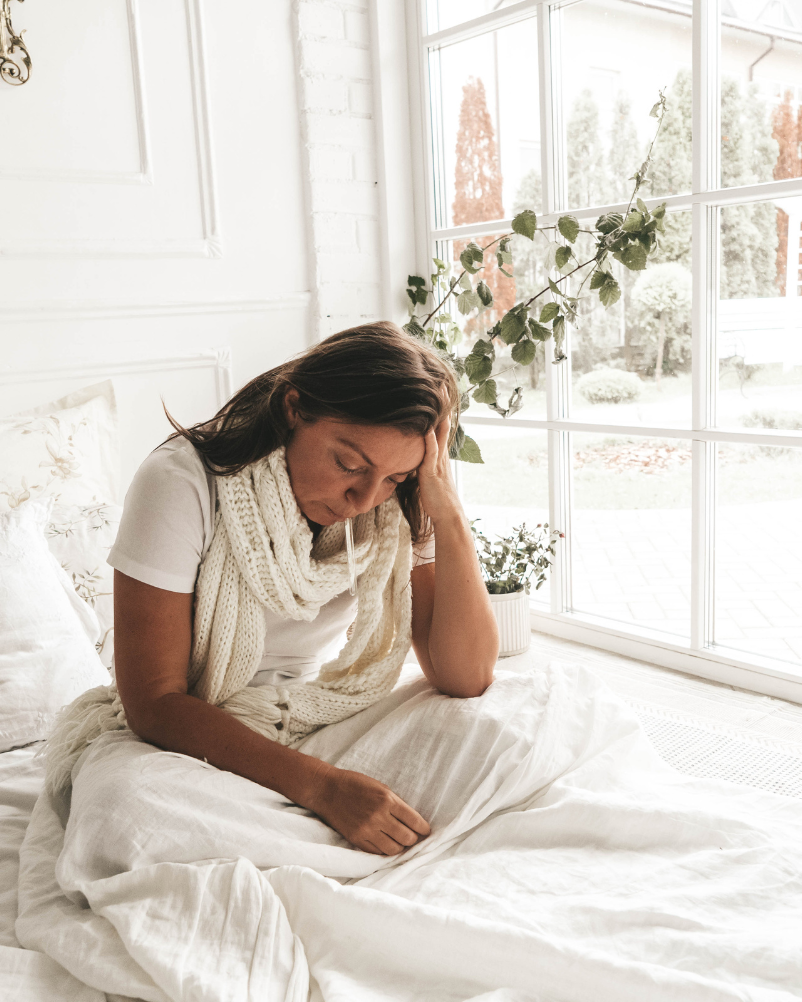
Introduction
Nothing is worse than waking up drenched with sweat, especially when you’re not even in the middle of a workout. If this happens to you during Menopause or perimenopause, it’s no wonder many women go to their doctors for answers. The good news is that most night sweats are perfectly normal – and the bad news is that some can be signs of serious illness. In this article, I will review ten questions to ask yourself when determining whether or not it’s time for an appointment with your doctor.
Like many women in perimenopause and Menopause, you are probably used to sweating at night.
Night sweats are a common symptom of Menopause and perimenopause. This type of sweating usually happens at night, lying down, or just about to fall asleep. It can be alarming to wake up in the middle of the night drenched with sweat that seems to come out of nowhere. You may think that you have a fever or other illness, but in reality, this is normal for many women during their later years.
So what causes night sweats? There are many reasons why this happens:
- Stress – When you’re under stress, whether work or family-related, your body releases stress hormones into your bloodstream. These hormones can cause an increase in body temperature, which can lead to sweating while sleeping at night.
- Menopause – Women going through perimenopause or Menopause often experience hot flashes as one of their first symptoms; sometimes, hot flashes will cause them to sweat profusely during sleep as well
However, like the rest of us, you’re suspicious when there seems to be no reason for those unwelcome nighttime sweats.
So you have night sweats, and you don’t know if it’s time to worry about your health or if it is just a symptom of Menopause.
Night sweats are very common, even when we’re not sick. Night sweats can be caused by hot temperatures (they lower our body temperature), hot flashes, and sleep disturbances. While they may not sound too serious, they indicate a problem with your thyroid gland — the gland that controls many vital functions in the body, including temperature regulation. If left untreated, severe night sweats could lead to serious illnesses such as hyperthyroidism or hypothyroidism, which affects millions of Americans every year. Therefore, it’s essential to seek help from a professional healthcare provider if your symptoms persist despite treatment options. It could mean something more serious is happening underneath those pesky night sweats!
Here’s how you can tell if it’s just Menopause or something more:
Here are ten questions to ask yourself when determining whether to go to the doctor:
1. Do you have a fever?
Fever is an important sign of infection. If you are sick with a viral illness, such as the common cold, your body temperature may rise above 100°F (37.8°C). However, a fever can also be caused by bacterial infections or other severe illnesses like cancer, so it’s important to see your doctor if you experience this symptom.
While Menopause does not cause fevers, women undergoing perimenopause often report feeling hot or warm inside their bodies when they are “in heat” (ovulating). Feeling hot can make it difficult to distinguish between typical perimenopause symptoms and actual fevers associated with severe infections or cancer conditions.
2. Have you recently traveled?
Some women find that their sleep patterns are disrupted when they travel. It can be due to jet lag, being in a different time zone, or being more sensitive to light and sounds.
- Traveling can disrupt your sleep patterns.
- You may have trouble sleeping in a strange place.
- It’s hard to get comfortable when you’re away from home.
- The unfamiliar room layout may make it harder for you to fall asleep.
3. Are you taking any new medications? (Many medicines can cause every woman to sweat more.)
Your doctor might be able to help you get some relief from your night sweats by adjusting or discontinuing your medications. If you’re taking a prescription or over-the-counter medicines, let your doctor know if you’re experiencing symptoms of night sweats. Medications that can cause hot flashes include:
- antidepressants
- antipsychotics
- antihistamines (such as Allegra, Claritin and Benadryl)
- beta-blockers (used for high blood pressure and heart disease)
- diuretics (used to increase urine output in people who suffer from edema)
4. Have you stopped exercising or eating differently?
If you have not changed your diet or exercise routine recently, it is unlikely that this is the cause of your night sweats. However, if so, it may be helpful to ensure you are getting the right calories and nutrients from food sources.
5. Are your night sweats accompanied by pain?
This question is important for a few reasons. First, the pain may be caused by something other than Menopause. A wide range of conditions can cause acute or chronic pain in women over fifty, including, but not limited to: arthritis; bursitis; gallstones; kidney stones; fibromyalgia (a syndrome characterized by widespread musculoskeletal pain and fatigue); irritable bowel syndrome, and Crohn’s disease to name a few! So if you’re experiencing unexplained discomfort with your night sweats, please don’t dismiss it as a symptom of Menopause alone! Remember that many conditions can cause this type of symptomatic presentation, so you must see your physician as soon as possible if you’re experiencing new onset symptoms like these.
6. Do you have other symptoms, such as frequent urination, shortness of breath, or headaches?
Night sweats can result from many health problems, and you should consult your doctor if you have any other symptoms. Some of these include:
- Frequent urination
- Shortness of breath
- Headaches
7. Have your night sweats persisted for over two weeks? (If they have, it’s time to see a doctor.)
If you’ve had night sweats for more than two weeks, you should see a doctor. If your night sweats are accompanie6.d by pain or other symptoms, such as chills and feverishness, then it’s time to get checked out.
It’s also essential to see a medical professional if these symptoms have lasted longer than two weeks.
8. Do your night sweats coincide with your period? (If so, they could also be PMS-related.)
If you have night sweats and are also experiencing any other symptoms of PMS, you may be able to treat your symptoms naturally. For example, you can try taking a supplement like black cohosh, which has been shown to relieve the physical symptoms of PMS.
If medications or lifestyle changes don’t help, see your doctor about getting tested for hypothyroidism. In addition, you must follow up with your doctor if you experience unusual symptoms like these so they can figure out what’s causing them and recommend treatment if necessary.
9. Is it just one side of your body sweating excessively? (If so, it could signify an ectopic pregnancy.)
If you’re sweating excessively on one side of your body, it could be a sign of an ectopic pregnancy. An ectopic pregnancy occurs when a fertilized egg attaches itself to the lining of the fallopian tube rather than inside the uterus. If left untreated, this can lead to severe injury and even death. In addition, specific symptoms could indicate an ectopic pregnancy, including bleeding from the vagina between periods (a symptom often mistaken for normal menstruation), abdominal pain or swelling, dizziness, fainting spells, nausea, and vomiting (also common during PMS).
If you think you might be experiencing one of these symptoms or want to know more about how this condition affects women during Menopause, talk with your doctor immediately so they can help diagnose what’s going on!
10. Are you drenched with sweat for hours at a time? (Or do you wake up damp with only a few drops of sweat?)
Sweating is a natural process that helps to cool the body down. The sweat glands secrete salty moisture, evaporating on the skin and causing cooling through evaporation. But when you’re sweating for hours at a time, it can be very uncomfortable, embarrassing, and even dangerous.
The best thing you can do is to keep yourself well hydrated by drinking plenty of water throughout the day; this will help your body to cope with its temperature better. But, on the other hand, if you’re drinking enough water but still waking up drenched in sweat several times each night, it could indicate that something else is going on with your body – possibly Menopause!
If this isn’t helping and you’re still struggling with night sweats, please speak with your doctor, who may be able to help find out what’s going on!
Conclusion
If you are experiencing night sweats, it’s important to know the difference between normal Menopause and a medical condition. A doctor can help you determine if something more serious is going on with your health or if you need to be prepared for the changes that come with perimenopause and menopause stages.
Takeaway: Night sweats during Menopause can be uncomfortable and disruptive, but they are not necessarily a sign of illness.
What’s your experience with night sweats? We would love to hear your thoughts, so feel free to add your comments below ?
Let’s support each other. Use the share buttons in this article so more women can get help and feel great!
BUT DON’T LEAVE JUST YET!
Getting the facts will take out the guessing. Check THIS out!


